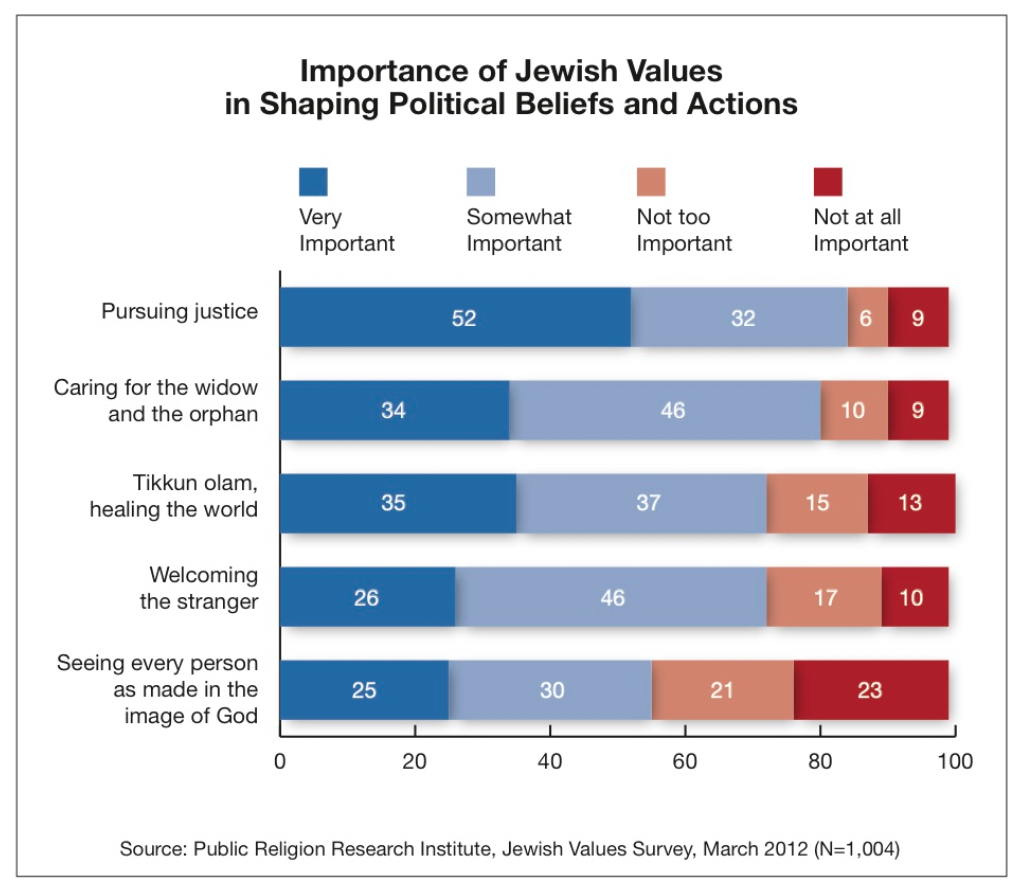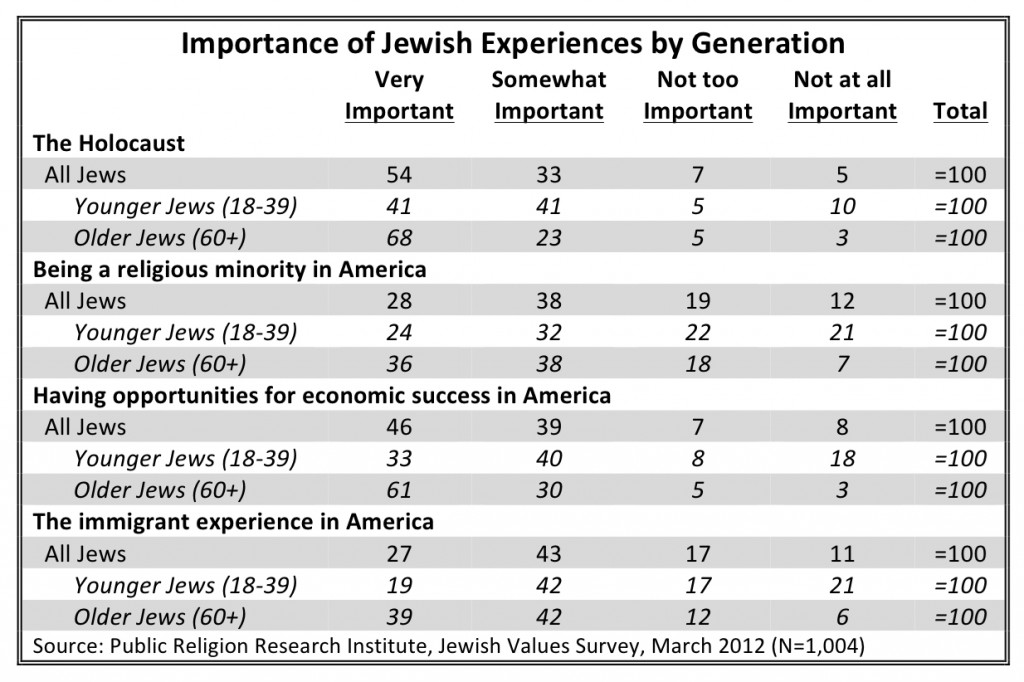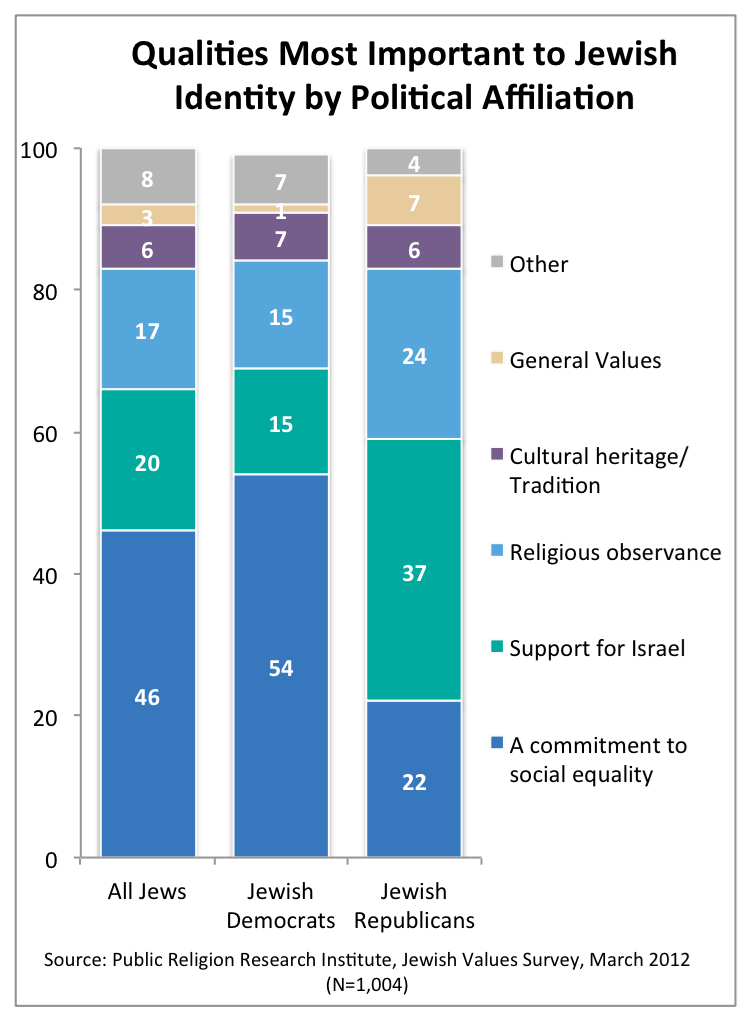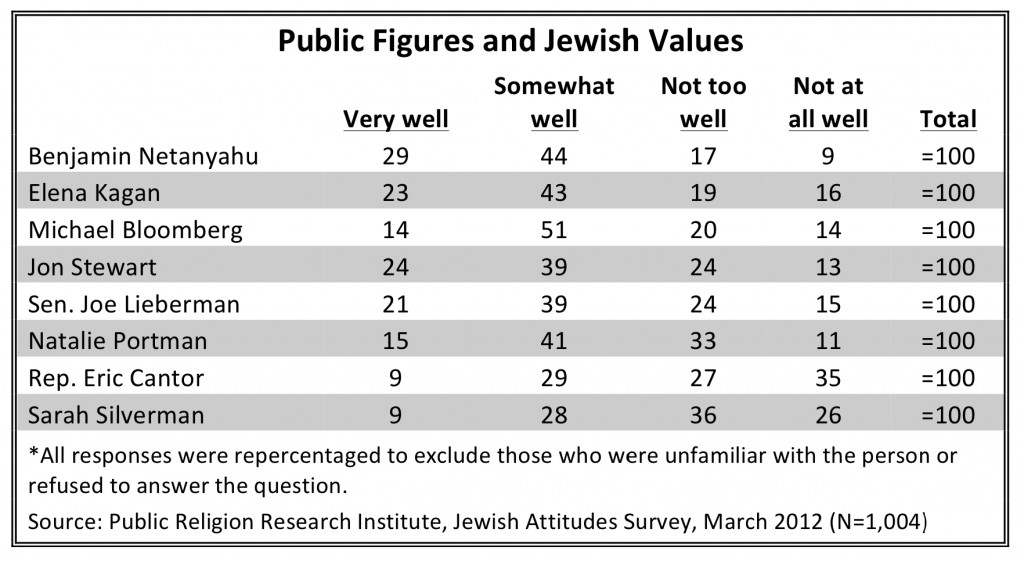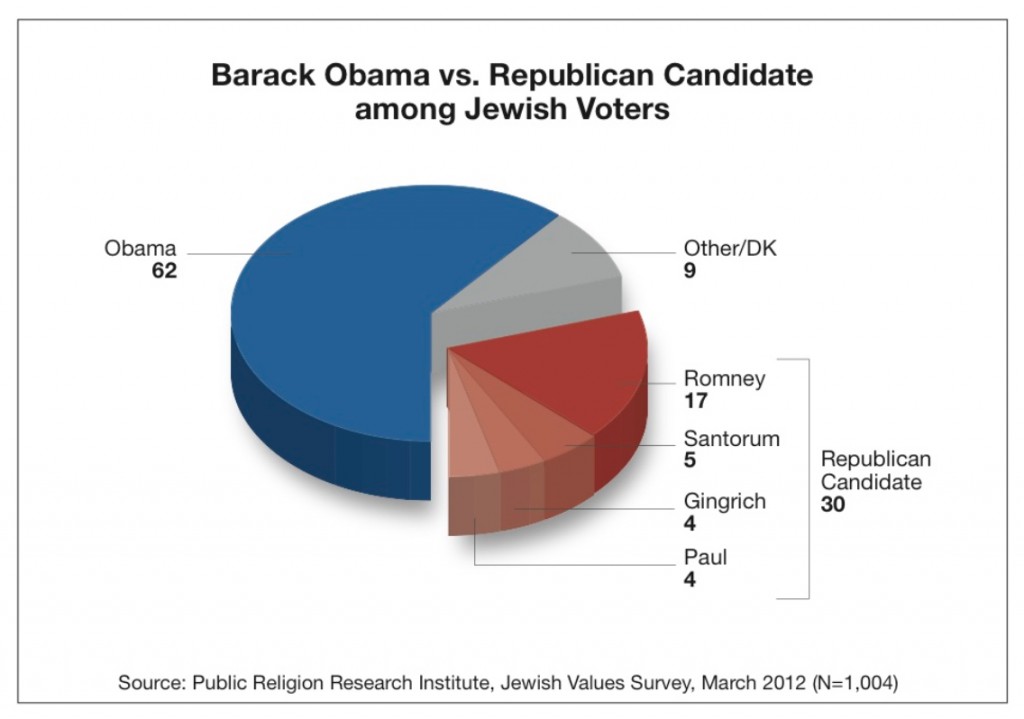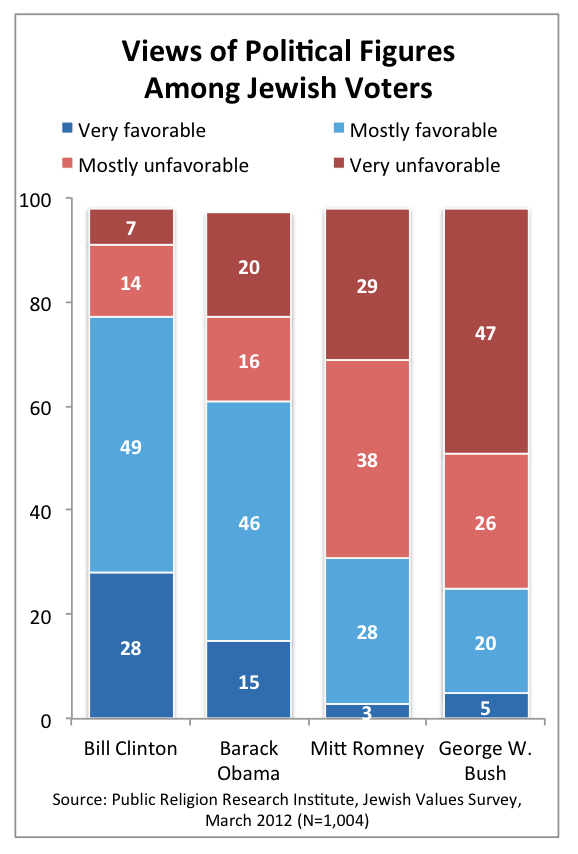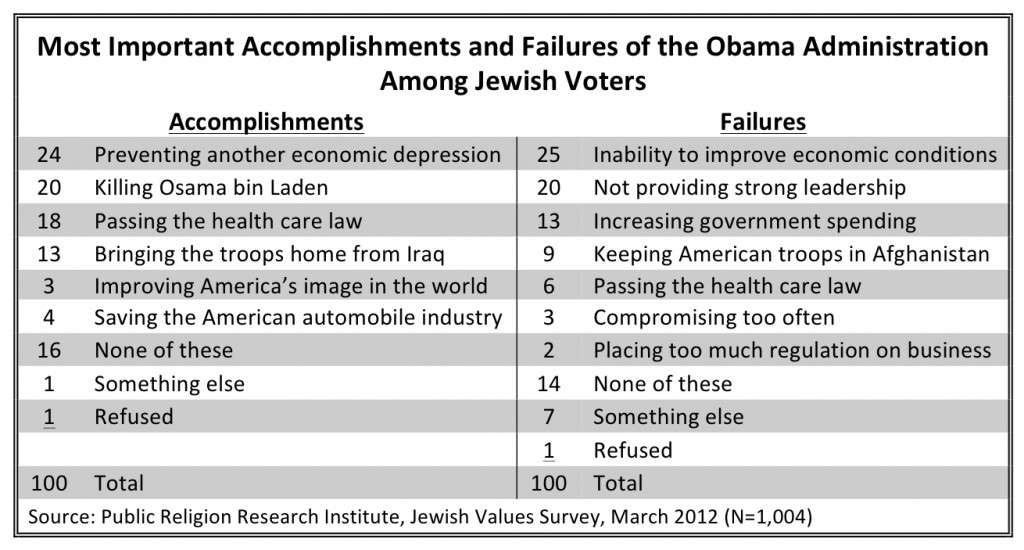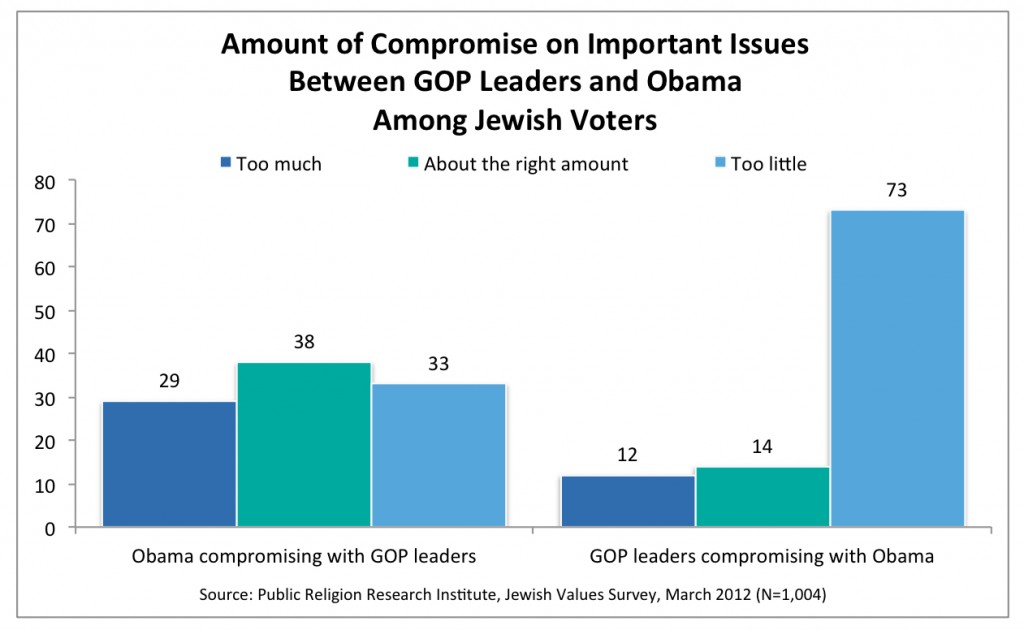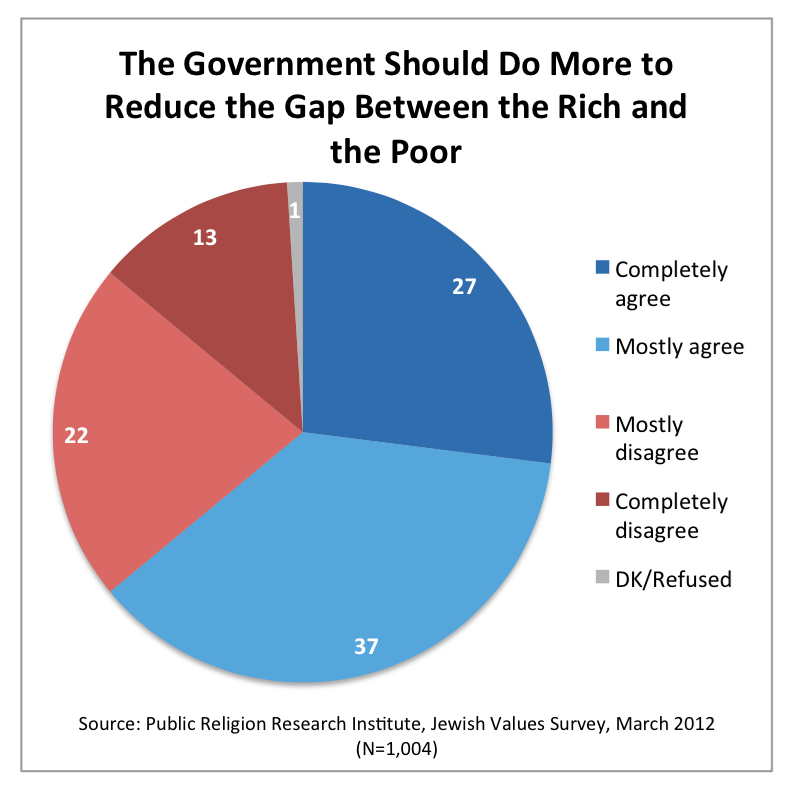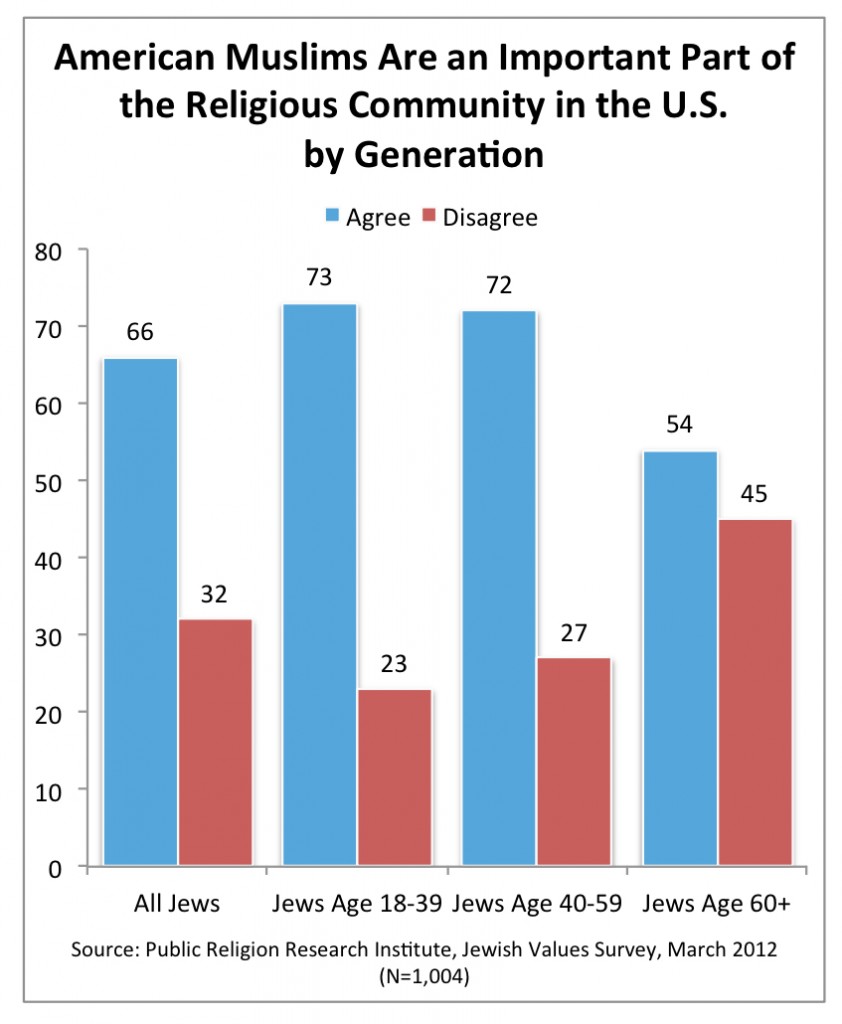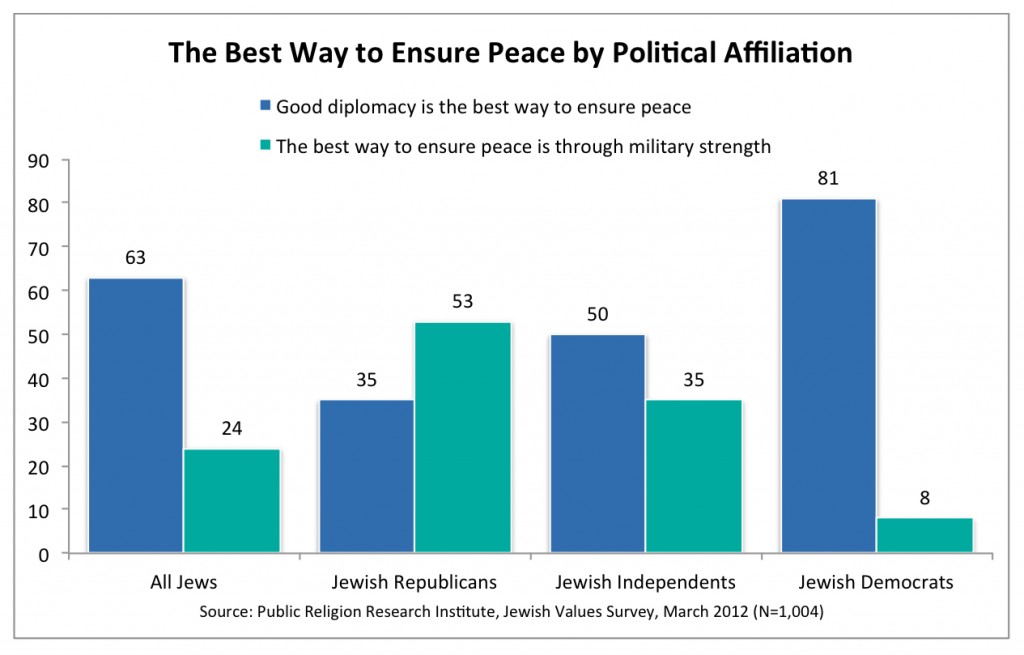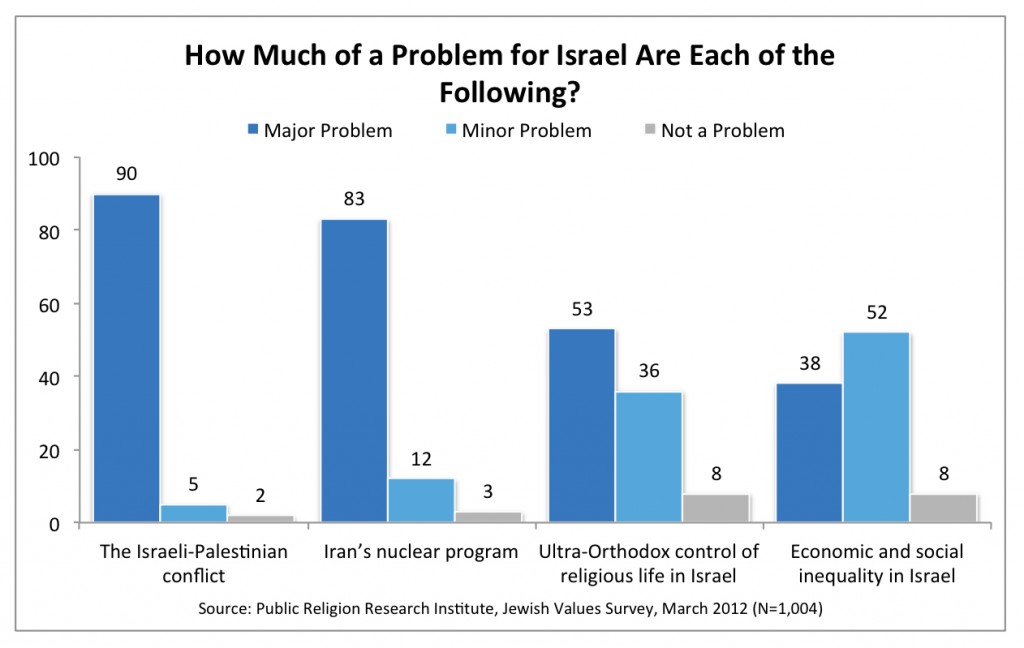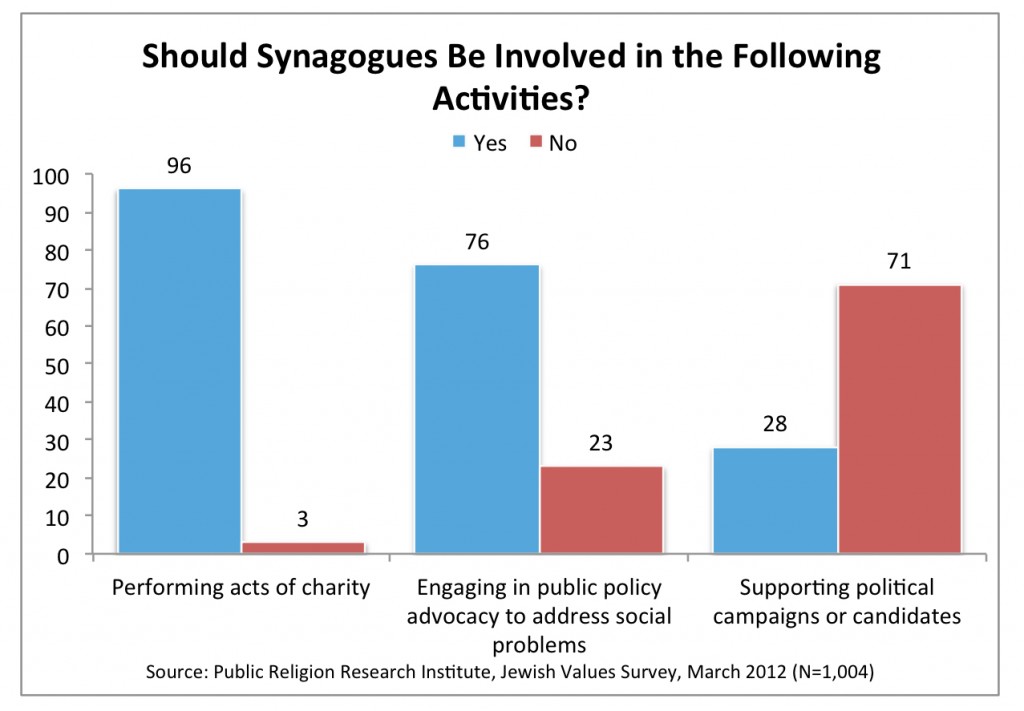Executive Summary
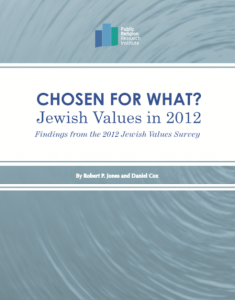 At least 8-in-10 American Jews say that pursuing justice (84%) and caring for the widow and the orphan (80%) are somewhat or very important values that inform their political beliefs and activity.
At least 8-in-10 American Jews say that pursuing justice (84%) and caring for the widow and the orphan (80%) are somewhat or very important values that inform their political beliefs and activity.
- More than 7-in-10 also say that tikkun olam, healing the world (72%), and welcoming the stranger (72%) are somewhat or very important values.
- A majority (55%) say that seeing every person as made in the image of God is somewhat or very important in informing their political beliefs and activity.
More than 8-in-10 Jews say that the experiences of the Holocaust (87%) and having opportunities for economic success in America (85%) are somewhat or very important for informing their political beliefs and activity. Seven-in-ten (70%) Jews cite the immigrant experience in America, and approximately two-thirds (66%) say that being a religious minority in America has a somewhat or very important influence on their political beliefs and activity.
When asked which qualities are most important to their Jewish identity, nearly half (46%) of American Jews cite a commitment to social equality, twice as many as cite support for Israel (20%) or religious observance (17%). Fewer than 1-in-10 say that a sense of cultural heritage and tradition (6%) or a general set of values (3%) are most important to their Jewish identity.
The most important issue for Jewish registered voters ahead of the 2012 election is the economy, with 51% reporting that this issue would be most important to their vote.
- Fifteen percent cite the growing gap between the rich and the poor, and about 1-in-10 report that health care and the federal deficit (10% and 7% respectively) are the most important issues to their vote this year.
- Other issues that fall at the bottom of the priority list are national security (4%), Israel (4%), Iran (2%), the environment (1%), immigration (1%), same-sex marriage (1%), and abortion (1%).
Eight months before the 2012 election, 62% of Jewish voters say they would like to see Obama re-elected in 2012, more than twice the number who say they would prefer that a Republican candidate win the election (30%).
- Current support for Obama among Jewish voters is significantly higher than the general population and nearly identical to levels of support for Obama among Jewish registered voters at a comparable point in the 2008 campaign.
- Among Jewish voters who prefer that a Republican candidate win the 2012 election, Mitt Romney has the greatest support (58%), followed by Rick Santorum (15%), Newt Gingrich (13%), and Ron Paul (12%).
- Among Jewish voters who say they supported Barack Obama in 2008, an overwhelming majority (86%) say they would like to see the President re-elected; only 7% of Jewish voters who supported Obama in 2008 say they would prefer to see a Republican candidate win the 2012 election.
- Jewish voters who supported John McCain in 2008 demonstrate similar loyalty in their voting preferences, with 92% reporting that they would prefer it if a Republican candidate won the election.
Although American voters overall are more likely to have a favorable view of Obama personally than to rate his job performance positively, Jewish voters evaluate Barack Obama roughly the same on these two metrics. More than 6-in-10 Jewish voters report having a very favorable (15%) or mostly favorable (46%) view of Barack Obama. Roughly 6-in-10 (58%) Jewish voters also say they approve of the way Barack Obama is handling his job as President, compared to 34% who disapprove.
American Jews are not anti-wealth nor anti-Wall Street, but overall nearly three-quarters (73%) say that the United States’ economic system unfairly favors the wealthy.
- Nearly two-thirds (64%) of American Jews agree that the government should do more to reduce the gap between the rich and the poor, while roughly one-third (35%) disagree.
- More than 8-in-10 (81%) favor increasing the tax rate on Americans earning more than $1 million a year, compared to 17% who oppose this policy.
Two-thirds (66%) of American Jews agree that American Muslims are an important part of the religious community in the United States, compared to 32% who disagree. Similarly, only about 1-in-5 (22%) American Jews believe that American Muslims ultimately want to establish Shari’a or Islamic law as the law of the land in the United States, compared to 76% who disagree.
By a margin of more than 2 to 1, American Jews say that good diplomacy rather than military strength is the best way to ensure peace (63% vs. 24% respectively). In the case of Iran, if diplomacy and other deterrents fail, most American Jews support military action. Nearly six-in-ten (59%) American Jews agree that the U.S. should take military action to prevent Iran’s development of a nuclear weapon if economic sanctions are unable to stop Iran’s nuclear weapons program, compared to 37% who disagree.
More than 8-in-10 American Jews rank the Israeli-Palestinian conflict (90%) and Iran’s nuclear program (83%) as major problems within Israel. A majority (53%) of American Jews also agree that Ultra-Orthodox control of religious life in Israel is a major problem, while only 4-in-10 (38%) cite economic and social inequality in Israel as a major problem.
A majority (54%) of American Jews say that relations between Israel and the U.S. are about the same as they have been in the past, while 7% say they are better, and 37% say they are worse.
When asked to describe their opinions about President Obama’s handling of the Arab-Israeli conflict, American Jews are divided. Twenty percent report that they agree with the President’s policies and that they like the way he is executing these policies. Fifteen percent say that they agree with the President’s policies but don’t like the way he is executing these policies. About 3-in-10 (28%) say they disagree with the President’s policies.
- Notably, over one-third (36%) of American Jews say they are not sure about their opinion of how President Obama is handling the Arab-Israeli conflict.
- A slim majority (53%) of American Jews say that, generally speaking, they would support the establishment of a Palestinian state, while 42% say they would be opposed.
There is strong agreement among American Jews about the types of activities in which synagogues should be engaged. There is near unanimity (96%) in the belief that synagogues should be involved in acts of charity.
- Approximately three-quarters (76%) of American Jews also agree that synagogues should be engaged in public policy advocacy to address social problems.
- In contrast, more than 7-in-10 (71%) say that synagogues should not be involved in supporting political campaigns or candidates.
When asked about the most important Jewish holiday to them personally, a plurality (43%) of Jews named Yom Kippur, followed by Passover (25%), Hanukkah (10%), and Rosh Hashanah (10%). More than two-thirds (68%) of Jews say they are planning to participate in a Passover Seder this year. Strong majorities of nearly every demographic group report that they are planning to attend a Seder this year.
I. Jewish Values, Experience, and Identity in Public Life and Politics
A Brief Introduction
The Jewish Values Survey set out to understand distinctive Jewish values, culture, and experiences, and their connections to Jewish political beliefs and behaviors. The survey found strong links between the values and cultural worldview that American Jews bring to American public life. The nationally representative sample on which this report is based is comprised of respondents who identify as Jewish by religion, in addition to respondents who identity as Jewish in other ways (e.g., ethnically or culturally Jewish). See Appendix 1 for a more thorough discussion of the composition of the sample included here.
The survey clearly revealed a set of core religious values and experiences, which in turn shape Jewish political belief and behavior. On many of the more deeply held values, there is striking agreement across demographic differences. On other values and particular issues, there remains serious disagreement within the Jewish community that often runs along denominational, political, generational, and educational lines. (1) For comparisons between the views of Jewish Americans and Americans overall, please see Appendix 2.
Jewish Religious Values and Politics
The survey asked respondents to rate the importance of five Jewish religious and cultural values for informing their political beliefs and activity. A majority of respondents say that all five religious values are at least somewhat important for informing their political beliefs and activity, but there is considerable range in relative importance among the five values. At least 8-in-10 American Jews say that pursuing justice (84%) and caring for the widow and the orphan (80%) are somewhat or very important values that inform their political beliefs and activity. More than 7-in-10 also say that tikkun olam, healing the world (72%), and welcoming the stranger (72%) are somewhat or very important values. A majority (55%) say that seeing every person as made in the image of God has a somewhat or very important influence on their political beliefs and activity. This hierarchy of the relative importance of Jewish values is generally shared across demographic subgroups, with a few exceptions. Pursuing justice and caring for the widow and the orphan generally rank the highest, followed by tikkun olam and welcoming the stranger, with seeing every person as made in the image of God ranking the lowest.
Among denominational groups, the largest differences are between Jews who claim a religious affiliation and cultural Jews who identify as “just Jewish.” For example, while the rank order of Jewish values remains similar, those who identify as “just Jewish” are less likely than denominationally affiliated Jews to say that each of these values are somewhat or very important for informing their political beliefs and activities. The most dramatic differences are on the value of seeing every person as made in the image of God. More than 6-in-10 Conservative (67%) and Reform (62%) Jews say this value is somewhat or very important, compared to only 25% of cultural Jews.
More than three-quarters of Jewish Democrats say that the values of tikkun olam (76%) and welcoming the stranger (78%) are somewhat or very important, compared to roughly 6-in-10 Jewish Republicans who say the values of tikkun olam (64%) and welcoming the stranger (59%) are somewhat or very important. More than 6-in-10 (63%) Jewish Democrats say that seeing every person as made in the image of God is somewhat or very important, compared to 53% of Jewish Republicans.
Younger Jews (age 18-39) are generally less likely than older Jews (age 60 and older) to say that each of these values are somewhat or very important. However, with the exception of seeing every person as made in the image of God, strong majorities of younger Jews say each of the other values are somewhat or very important. Nearly 6-in-10 (58%) older Jews say that seeing every person as made in the image of God is somewhat or very important, compared to only 43% of younger Jews.
Jewish Experiences and Politics
The survey also asked respondents to rate the importance of four Jewish experiences in terms of how they inform their political beliefs and activity. At least two-thirds of American Jews say all four Jewish experiences are at least somewhat important for informing their political beliefs and activity, but there is considerable range in relative importance among the four experiences. More than 8-in-10 Jews say that the experiences of the Holocaust (87%) and having opportunities for economic success in America (85%) are somewhat or very important for informing their political beliefs and activity. Seven-in-ten (70%) Jews cite the immigrant experience in America, and approximately two-thirds (66%) say that being a religious minority in America is somewhat or very important.
Among religious groups, there are few differences between Reform and Conservative Jews on the importance of these Jewish experiences for informing political beliefs and activity. However, cultural Jews who identify as “just Jewish” are significantly less likely to say that each of these experiences are somewhat or very important. The most striking difference between denominationally affiliated Jews and cultural Jews is on the experience of being a religious minority in America. At least three-quarters of Conservative (79%) and Reform (75%) Jews say being a religious minority in America is a somewhat or very important experience shaping their political beliefs, compared to only 43% of cultural Jews.
Jewish Democrats and Jewish Republicans are in agreement about the importance of having opportunities for economic success in America (87% and 89% respectively) and experiences of the Holocaust (85% and 88% respectively) for shaping their political beliefs and activity. Nearly three-quarters (74%) of Jewish Democrats and roughly 6-in-10 (62%) Jewish Republicans say that the immigrant experience in America is somewhat or very important for informing their political beliefs and activity.
There are significant generational differences regarding the importance of these Jewish experiences in shaping political beliefs and activity. Younger Jews are approximately 20 points less likely than older Jews to say that the immigrant experience in America (61% vs. 81% respectively) and being a religious minority in America (56% vs. 74% respectively) are somewhat or very important for shaping political beliefs and behavior.
While there is broad agreement across subgroups that the Holocaust is one of the most important Jewish experiences shaping their political beliefs and activity, there are significant variances in intensity among several subgroups. Older Jews (68%), Jews who do not have a college degree (63%), and Jewish women (61%) are more likely than other Jews to say that the experience of the Holocaust is very important for informing their political beliefs and behavior.
Jewish Identity
The Importance of Jewish Identity
More than 4-in-10 (42%) American Jews say that being Jewish is either very important or the most important thing in their lives. Approximately 3-in-10 say being Jewish is somewhat important (29%), and approximately 3-in-10 (29%) say being Jewish is either not too important or not at all important in their lives.
There are large differences on this question by denominational identity. Nearly two-thirds (64%) of Conservative Jews say that being Jewish is very important or the most important thing in their lives, compared to 39% of Reform Jews and only 10% of Jews who identify as “just Jewish.” Nearly three-quarters (73%) of Jews who are members of synagogues say that being Jewish is very important or the most important thing in their lives, compared to only 22% of those who are not members of a synagogue.
There are no large differences by political ideology or partisanship, but there is significant variation by generation, gender, and education. Older Jews (age 60 and older) are significantly more likely than younger Jews (age 18-39) to say that being Jewish is very important or the most important thing in their lives (52% vs. 29% respectively). Half (50%) of Jewish women say that being Jewish is very important or the most important thing in their lives, compared to 32% of Jewish men. Finally, nearly half (48%) of Jews with a post-graduate degree say that being Jewish is very important or the most important thing, compared to 39% of Jews with less than a college education.
Qualities Most Important to Jewish Identity
When asked which qualities are most important to their Jewish identity, nearly half of American Jews cite a commitment to social equality—twice as many as cite support for Israel (20%) or religious observance (17%). Fewer than 1-in-10 volunteered that a sense of cultural heritage and tradition (6%) or a general set of values (3%) are most important to their Jewish identity.
The primacy of a commitment to social equality for Jewish identity is generally shared across denominational groups, and between Jews who are members of synagogues and Jews who are not. However, there are large partisan differences. Among Jewish Republicans, a plurality (37%) cite support for Israel as the quality most important to their Jewish identity, followed by religious observance (24%) and a commitment to social equality (22%). In contrast, a solid majority (54%) of Jewish Democrats cite a commitment to social equality as most important to their Jewish identity, and rank both religious observance (15%) and support for Israel (15%) a distant second. Jewish Independents look like Jews overall. There are no large differences by age, gender, or educational attainment.
Public Figures and Jewish Values
The survey asked respondents to report how well they thought eight different Jewish political, business, and cultural leaders represented Jewish values. Among those who knew enough about the leader in question to express an opinion, solid majorities say that Israeli Prime Minister Benjamin Netanyahu (73%), U.S. Supreme Court Justice Elana Kagen (66%), New York City Mayor Michael Bloomberg (65%), comedian Jon Stewart (63%), Senator Joe Lieberman (60%), and actress Natalie Portman (56%) represent Jewish values somewhat or very well. In contrast, fewer than 4-in-10 say Rep. Eric Cantor (38%) and comedian Sarah Silverman (37%) represent Jewish values somewhat or very well.
II. Jewish Voters and the 2012 Election
Issue Priorities in the 2012 Election
The most important issue for Jewish registered voters ahead of the 2012 election is the economy, with 51% reporting that this issue is most important to their vote. (2) Fifteen percent cite the growing gap between the rich and the poor, and about 1-in-10 report that health care and the federal deficit (10% and 7% respectively) are the most important issues to their vote this year. Other issues that fall at the bottom of the priority list are national security (4%), Israel (4%), Iran (2%), the environment (1%), immigration (1%), same-sex marriage (1%), and abortion (1%).
Jewish voters who say that the economy is their top concern in the 2012 election say that the following issues rank second in terms of their vote: health care (27%), the growing gap between the rich and the poor (16%), the federal deficit (18%), and national security (19%). Again, concerns about Israel (6%), Iran (6%), immigration (2%), the environment (1%), same-sex marriage (1%), and abortion (1%) are low on the list of these voters’ second most important concerns.
The 2012 Vote
Eight months before the 2012 election, Jewish voters are strongly supportive of Barack Obama over a generic Republican candidate. Sixty-two percent of Jewish voters say that they would like to see Obama re-elected in 2012, more than twice the number who say that they would prefer that a Republican candidate win the election (30%). Current levels of support for Obama among Jewish voters are nearly identical to levels of support for Obama among Jewish registered voters at a comparable point in the 2008 campaign. (3)
Among Jewish voters who prefer that a Republican candidate win the 2012 election, Mitt Romney has the greatest support, with 58% of these voters saying that they would prefer it if the former Massachusetts Governor won the GOP nomination. Rick Santorum (15%), Newt Gingrich (13%) and Ron Paul (12%) have roughly equal support among Jewish voters who prefer that a Republican win the 2012 general election.
There are no major differences in support for Obama between Jewish voters who identify with the Reform movement, Conservative movement, or who identify as “just Jewish.” Nor are there differences in support for Obama between Jewish voters who report synagogue membership and those who do not. There are also no significant generational differences in support for Obama. Jewish voters without a college degree are, however, considerably less likely to support Obama (51%), compared to Jewish voters with a college degree (68%) or a post-graduate degree (68%).
Among Jewish voters who say they supported Barack Obama in 2008, an overwhelming majority (86%) say they would like to see the President re-elected. Only 7% of Jewish voters who supported Obama in 2008 say they would prefer to see a Republican candidate win the 2012 election. Jewish voters who supported John McCain in 2008 demonstrate similar loyalty in their voting preferences, with 92% reporting that they would prefer it if a Republican candidate won the election.
Obama enjoys an advantage over Romney among their respective supporters in terms of excitement about voting. A majority (55%) of Jewish voters who report that they would like to see Obama re-elected also say that they would be excited to cast a vote for the President, compared to 44% who say that they would not be excited. Among Jewish voters who prefer that Mitt Romney win the general election, roughly 4-in-10 (39%) say they would be excited to vote for him, compared to 6-in-10 (60%) who say they would not be excited.
In the 2012 congressional elections, Jewish voters’ preferences closely mirror their presidential preferences. Sixty-five percent of Jewish voters say that if the elections for Congress were held today, they would vote for the Democratic candidate in their district, while 27% say they would vote for the Republican candidate.
Party Affiliation and Views of the Political Parties
Seven-in-ten American Jewish voters identify with (50%) or lean toward (20%) the Democratic Party, compared to approximately 3-in-10 who identify with (13%) or lean toward (16%) the Republican Party.
Consistent with their voting preferences and party affiliation, 6-in-10 (60%) Jewish voters have a favorable view of the Democratic Party, compared to 39% who have an unfavorable view. About three-quarters (76%) of Jewish voters have an unfavorable view of the GOP, while about 1-in-5 (22%) have a favorable opinion of the Republican Party.
Evaluations of Obama and the Obama Presidency
More than 6-in-10 Jewish voters report having a very favorable (15%) or mostly favorable (46%) view of Barack Obama. Fewer than 4-in-10 (36%) have an unfavorable opinion of the current President. Obama’s personal favorability rating is lower than the last Democratic president, Bill Clinton, who is viewed very positively among Jewish voters. Nearly 8-in-10 (77%) Jewish voters have a favorable view of Clinton. In contrast, fewer than one-third of Jewish voters have a favorable view of the likely GOP nominee, Mitt Romney (31%), or the last Republican President, George W. Bush (25%). More than two-thirds of Jewish voters say they have a mostly or very unfavorable opinion of Romney (67%) and Bush (73%).
Although American voters overall are more likely to have a favorable view of Obama personally than to rate his job performance positively, Jewish voters evaluate Barack Obama roughly the same on these two metrics. Roughly 6-in-10 (58%) Jewish voters say they approve of the way Barack Obama is handling his job as President, compared to 34% who disapprove.
Jewish voters are divided on how they feel about the Obama administration. Nearly equal numbers of Jewish voters report being satisfied (32%) as report being disappointed (36%) with the Obama presidency. Fourteen percent say they are worried, and nearly 1-in-10 (9%) report feeling angry. Only 3% of Jewish voters say they are excited about the Obama presidency so far.
Not surprisingly, Democratic and Republican Jewish voters have strikingly different emotions about the Obama presidency. Half of Jewish Democratic voters report being either excited (5%) or satisfied (45%) with the Obama presidency. Significantly, 31% of Jewish Democratic voters report feeling disappointed. About 1-in-10 (13%) Jewish Democratic voters report feeling worried, and 2% report being angry. In contrast, no Jewish Republican voters report being excited, and 7% say they are satisfied with the Obama presidency so far. Nearly 4-in-10 (39%) say they feel disappointed, roughly 1-in-4 (26%) report feeling angry, and about 1-in-5 (18%) say they are worried.
There is also a lack of consensus among Jewish voters about the Obama administration’s most positive accomplishment. Approximately one-fourth (24%) say that preventing another economic depression is the administration’s greatest accomplishment. Roughly 1-in-5 say that killing Osama bin Laden (20%) and passing the health care law (18%) represent the administration’s greatest accomplishment. Fewer Jewish voters say that bringing the troops home from Iraq (13%), improving America’s image around the world (3%), and saving the American automobile industry (4%) represent the administration’s most positive accomplishment.
There is also an absence of widespread agreement among Jewish voters about the Obama administration’s biggest failing. One-quarter cite the administration’s inability to improve economic conditions. A similar number of Jewish voters cite a lack of strong leadership (20%) and the administration’s willingness to compromise too often (3%). Thirteen percent say that the administration’s biggest failure is increasing government spending. Less than 1-in-10 reference keeping American troops in Afghanistan (9%), passing the health care law (6%), or placing too much regulation on business (2%) as the Obama administration’s greatest failure.
Nearly three-quarters (73%) of Jewish voters believe that Republican leaders are doing too little to compromise with Obama. Only 12% of Jewish voters say GOP leaders are compromising too much, and 14% say GOP leaders are compromising about the right amount. Jewish voters are divided over whether they believe Obama is doing too much (29%), too little (33%) or about the right amount (38%) to compromise with Republican leaders in Congress on important issues.
III. The Economy and Inequality
The American Dream and Economic Outlook
American Jews are somewhat divided over whether the American Dream—the notion that if you work hard, you’ll get ahead—continues to be relevant. Close to half (45%) of American Jews believe that the American Dream once held true but does not hold true anymore. Less than 4-in-10 (37%) believe the American Dream still holds true, and 1-in-10 say that it never held true. Younger Jews (age 18 to 39) are about four times more likely than older Jews (age 60 and up) to believe that the American Dream never held true (19% vs. 5% respectively).
Consistent with these mixed views, four-in-ten American Jews believe that in their lifetime, their children will be less well off financially than they are. An equal number (40%) predict that their children will be about as well off as they are, and less than 1-in-5 (19%) believe that their children will be better off than they are. Nearly half (47%) of older Jews believe their children will be less well off financially than they are, compared to roughly one-third (34%) of younger Jews.
Role of Government in Addressing Inequality
Nearly two-thirds (64%) of American Jews agree that the government should do more to reduce the gap between the rich and the poor, while roughly one-third (35%) disagree. There are stark partisan divisions, with fewer than one-third (31%) of Jewish Republicans supportive of increased government involvement to reduce the gap between the rich and the poor, compared to 54% of Jewish Independents and 8-in-10 (80%) Jewish Democrats. The differences between other demographic groups are modest.
More than 8-in-10 (81%) American Jews favor a proposal commonly referred to as “the Buffett Rule,” which would increase the tax rate on Americans earning more than $1 million a year, compared to 17% who oppose this policy. Again, there are no significant demographic differences by age, gender or education.
A majority (52%) of American Jews report that they would not be willing to pay more in taxes to fund federal programs that help the poor, while 4-in-10 say that they would be willing to pay more in taxes. Support for this policy is higher, however, among Jews with higher educational attainment and annual household income. For example, a majority (52%) of Jews with household incomes of $125,000 a year or more report that they would be willing to pay more taxes, compared to only 36% of Jews with household incomes of less than $30,000 a year. Similarly, half (50%) of Jews with postgraduate degrees report that they would be willing to pay more taxes to fund federal programs for the poor, compared to 28% of Jews without a college degree.
While there is awareness of and support for government action to address the gap between the rich and the poor, there is also skepticism about the effectiveness of government programs. A majority (54%) of American Jews believe that poor people have become too dependent on government assistance programs, although a significant minority (45%) disagree. There are no major demographic differences on this question, although some political differences stand out. Strong majorities of Jewish Republicans (76%) and Independents (65%) agree that poor people have become too dependent on government programs. In contrast, less than half (39%) of Jewish Democrats agree, and roughly 6-in-10 (59%) disagree.
Economic Inequality, Fairness, and Wealth
American Jews are not anti-wealth nor anti-Wall Street, but overall a strong majority believe that the economic system in the U.S. favors the wealthy. About half (49%) are concerned that not everyone gets an equal chance at success in this country today.
Nearly three-quarters (73%) of American Jews agree that the economic system in the U.S. unfairly favors the wealthy, compared to 1-in-4 who disagree. Strong majorities of Jews in every income bracket agree with this statement, including 83% of those with household incomes of less than $30,000 a year and 67% of those with household incomes in excess of $125,000 a year. Again, there are sharp differences between Jewish Democrats and Republicans. Jewish Democrats (89%) and Independents (68%) are at least twice as likely as Jewish Republicans (34%) to agree that the economic system unfairly favors the wealthy.
Nearly half (49%) of all American Jews believe that one of the biggest problems in this country is that we don’t give everyone an equal chance in life, compared to roughly one-third (35%) who say that it is not really that big a problem if some people have more of a chance in life than others. More than 1-in-10 (12%) rejected these two statements. There are no significant differences between Jews by generation, educational attainment, or gender.
There is near unanimity among American Jews on whether they admire people who get rich by working hard: nine-in-ten Jews completely or mostly agree with this statement. There are no significant differences in opinion by age, gender or educational attainment.
More than 6-in-10 (62%) American Jews also believe that Wall Street makes an important contribution to the American economy, although relatively few reported that they completely agree (9%) with this statement.
Respondents were asked to rate their feelings toward certain groups on a 100-point scale, where ratings between 51 degrees and 100 degrees indicated that the respondent felt favorable and warm toward that group, while ratings between 1 degree and 49 degrees meant that the respondent did not feel favorably toward the group. Ratings of 50 degrees indicated that the respondent did not feel particularly warm or cold toward the group.
Of the two major political movements associated with economic inequality and the role of government in society—the Tea Party and Occupy Wall Street—American Jews report significantly warmer feelings toward the latter than the former, although neither group is viewed particularly positively. Occupy Wall Street scored an average of 44.3, while the Tea Party scored an average of 26.4. In comparison, the federal government in Washington scored an average of 34.9 and labor unions scored an average of 50.6.
IV. Jews and Other Religious and Ethnic Minorities
Immigrants and the DREAM Act
A solid majority (57%) of American Jews believe that the growing number of newcomers from other countries strengthens American society, while slightly more than 3-in-10 (32%) say that the growing number of newcomers from other countries threatens traditional American customs and values. There are few denominational differences on this question, although Jews who identify as “just Jewish” (67%) are more likely than Reform Jews (53%) to agree that the growing number of newcomers from other countries strengthens American society.
There are, however, significant political differences. A majority (56%) of Jewish Republicans agree that the growing number of newcomers from other countries threatens traditional American customs and values, while only one-third (33%) believe that the growing number of newcomers from other countries strengthens American society. Conversely, two-thirds (66%) of Jewish Democrats agree that the growing number of newcomers strengthens American society, while only one-quarter (25%) say that these newcomers threaten traditional American customs and values. There is also a significant generational gap: younger Jews (age 18-39) are more likely to agree with the notion that the growing number of newcomers from other countries strengthens American society, while older Jews (age 60 and older) are less likely to affirm this statement (70% vs. 51% respectively).
When asked about a proposal that embodies the central components of the DREAM Act – allowing illegal immigrants brought to the U.S. as children to gain legal resident status if they join the military or go to college – American Jews show strong support for the proposal, with 70% in favor and only 29% opposed.
Religious Groups: Mormons, Muslims, and the Christian Right
When asked to rate Mormons on the same 100-point scale described earlier, American Jews, on average, rated them at 47. The average rating for Muslims was somewhat lower, at 41.4. By contrast, when asked to rate the Christian Right, American Jews report an average of 20.9, a score indicating that American Jews hold considerably unfavorable feelings toward members of the Christian Right, significantly more so than toward Mormons or Muslims.
Despite the relatively cool feeling towards Muslims overall, responses to several other questions indicate that American Jews are, in general, favorably disposed towards American Muslims. Nearly two-thirds (66%) of American Jews agree that American Muslims are an important part of the religious community in the United States, compared to 32% who disagree. Similarly, less than one-quarter (22%) of American Jews believe that American Muslims ultimately want to establish Shari’a or Islamic law as the law of the land in the United States, compared to 76% who disagree.
There are significant generational and even greater political differences in views about Muslims’ place in the American religious community. Younger Jews are more likely than older Jews to agree that American Muslims are an important part of the religious community in the United States (73% vs. 54% respectively). Meanwhile, a majority of Jewish Republicans (57%) disagree that American Muslims are an important part of the religious community in the U.S., while nearly three-quarters (73%) of Jewish Democrats agree. Jewish Republicans are also twice as likely as Jewish Democrats to believe that American Muslims ultimately want to establish Shari’a law as law of the land in the U.S. (33% vs. 14% respectively).
V. Foreign Policy and Israel
Diplomacy and Military Intervention
By a margin of more than 2 to 1, American Jews say that good diplomacy rather than military strength is the best way to ensure peace (63% vs. 24% respectively). There are few denominational or demographic differences on this issue, although there are significant partisan divides. A majority (53%) of Jewish Republicans believe that the best way to ensure peace is through military strength, while over 8-in-10 (81%) Jewish Democrats say that good diplomacy is the best way to ensure peace. Among Jewish Independents, half say that good diplomacy is the best way to ensure peace, while 35% say the best way to ensure peace is through military strength.
Nearly six-in-ten (59%) American Jews agree that the U.S. should take military action to prevent Iran’s development of a nuclear weapon if economic sanctions are unable to stop Iran’s nuclear weapons program, compared to 37% who disagree. There are significant partisan differences: nearly 8-in-10 (78%) Jewish Republicans say the U.S. should take military action in the above scenario, compared to a slim majority (52%) of Jewish Democrats. A majority of Reform Jews (63%), Conservative Jews (61%), and Jews who identify as “just Jewish” (52%), agree that the U.S. should take military action to prevent Iran’s development of a nuclear weapon.
Israel
Visiting Israel
Just over one-third (35%) of American Jews report that they have been to Israel, while nearly two-thirds (64%) say they have not. Roughly equal numbers of Reform and Conservative Jews report having visited Israel (41% vs. 43% respectively). Fewer than 1-in-5 cultural Jews (16%) report that they have been to Israel. American Jews who are members of synagogues are about twice as likely as those who are not to say they have visited Israel (50% vs. 26% respectively). Women are more likely than men to report having visited Israel (43% vs. 27% respectively), while Jews with a post-graduate education are twice as likely as Jews without a college degree to say they have visited Israel (50% vs. 23% respectively).
Major Problems within Israel
When asked whether certain issues represent a major problem, minor problem, or not a problem for Israel, more than 8-in-10 American Jews rank the Israeli-Palestinian conflict (90%) and Iran’s nuclear program (83%) as major problems. A majority (53%) of American Jews also agree that Ultra-Orthodox control of religious life in Israel is a major problem, while roughly 4-in-10 (38%) cite economic and social inequality in Israel as a major problem.
There are few partisan differences between American Jews on the relative urgency of these problems. On the Israeli-Palestinian conflict and Iran’s nuclear program, there is strong bipartisan agreement. Younger Jews (age 18-39) are somewhat less likely than older Jews (age 60 and older) to see Iran’s nuclear program as a major problem for Israel, although overwhelming majorities of both groups believe that it is a major problem (72% vs. 91% respectively).
Jewish Democrats are more likely than Jewish Republicans to cite Ultra-Orthodox control of religious life in Israel as a major problem (56% vs. 33% respectively). Jewish Democrats are also more likely than Jewish Republicans to say that economic and social inequality is a major problem for Israel (44% vs. 21% respectively). There are few other demographic and denominational differences.
Relations Between the United States and Israel
A majority (54%) of American Jews say that relations between Israel and the U.S. are about the same as they have been in the past, while 7% say they are better, and nearly 4-in-10 (37%) say they are worse. There are few denominational differences, although Jews who belong to a synagogue are more likely than Jews who do not belong to a synagogue to say that U.S.-Israel relations are worse now than they have been in the past (47% vs. 31% respectively). Older Jews are also more likely than younger Jews to say that U.S.-Israel relations are worse than they have been in the past (44% vs. 27% respectively). American Jews who have visited Israel are more likely to believe that relations have worsened between the countries than those who have not (47% vs. 32% respectively).
Partisan differences are more striking: Jewish Republicans are nearly twice as likely as Jewish Democrats to say that U.S.-Israel relations are worse than they have been in the past (59% vs. 30% respectively). Jewish Democrats, meanwhile, are significantly more likely than Jewish Republicans to say that relations between Israel and the U.S. are about the same as they have been in the past (58% vs. 33% respectively).
The Arab-Israeli Conflict
When asked to describe their opinions about President Obama’s handling of the Arab-Israeli conflict, American Jews are divided. Twenty percent report that they agree with the President’s policies and that they like the way he is executing these policies, and 15% say that they agree with the President’s policies, but don’t like the way he is executing these policies. Nearly 3-in-10 (28%) disagree with the President’s policies. Notably, over one-third (36%) of American Jews say they are not sure about their opinion of how President Obama is handling the Arab-Israeli conflict.
There are few differences between denominationally affiliated Jews and cultural Jews, although Jews who are not members of a synagogue are less likely than Jews who are members of a synagogue to say that they disagree with the President’s policies (21% vs. 39% respectively). Jews who are not members of a synagogue are also more likely than Jews who are to say they are not sure how they view President Obama’s handling of the Arab-Israeli conflict (42% vs. 27%). There are also striking partisan differences. Nearly 7-in-10 (69%) Jewish Republicans say they disagree with the president’s policies, compared to only 11% of Democrats.
A slim majority (53%) of American Jews say that generally speaking, they would support the establishment of a Palestinian state, while 42% say they would be opposed. There are some demographic divides on this question: men are more likely than women to support the establishment of a Palestinian state (61% vs. 46% respectively), while older Jews are more likely than younger Jews to support the establishment of a Palestinian state (57% vs. 39% respectively). A majority (54%) of younger Jews are opposed to the establishment of a Palestinian state. Additionally, Jews with a postgraduate education are significantly more likely than Jews without a college degree to support the establishment of a Palestinian state (66% vs. 39% respectively).
Jewish Republicans and Jewish Democrats also differ significantly on whether they would support the establishment of a Palestinian state. Six-in-ten (60%) Jewish Democrats say that, generally speaking, they would support the establishment of a Palestinian state, compared to only 23% of Jewish Republicans. More than three-quarters (76%) of Jewish Republicans say they would oppose the establishment of a Palestinian state.
VI. Other Issues
Abortion
American Jews are overwhelmingly in favor of legal abortion in all (49%) or most (44%) cases. There is little denominational or demographic variation on this level of overall support. There are, however, varying degrees of intensity: Jewish Democrats are more than twice as likely as Jewish Republicans (55% vs. 25% respectively) to say abortion should be legal in all cases. Jewish Democrats’ support for abortion in all or most cases (95%) is also higher than that of Jewish Republicans, although roughly three-quarters (77%) of Jewish Republicans nevertheless maintain support for abortion in all or most cases.
Same-sex Marriage
Over 8-in-10 (81%) American Jews support allowing same-sex couples to marry legally, including more than half (51%) who say they strongly favor same-sex marriage. There are, however, significant generational and political differences on this question. Less than half (48%) of Jewish Republicans favor allowing gay and lesbian couples to marry, while 52% are opposed. By contrast, nearly 9-in-10 (89%) Jewish Democrats support same-sex marriage. Although there are large generational differences among the general public on this issue, both older and younger Jews express support for allowing gay and lesbian couples to marry (83% vs. 75% respectively). However, younger Jews are more likely than older Jews to strongly favor same-sex marriage (62% vs. 45% respectively).
The Environment
Nearly 7-in-10 (69%) American Jews are supportive of tougher laws and regulations to protect the environment, even if it raises prices or costs jobs. There are, however, stark political differences on this question. Only a quarter (26%) of Jewish Republicans say they would support tougher laws and regulations to protect the environment, compared to nearly 7-in-10 (68%) Jewish Independents and over 8-in-10 (81%) Jewish Democrats.
The Supreme Court and Health Care Reform
Nearly 6-in-10 (58%) American Jews say they would be opposed to the Supreme Court overturning the recent health care law, compared to 4-in-10 (40%) who report that they would favor this action by the Supreme Court. The issue is marked by an intense gap between Jewish Democrats and Jewish Republicans. Over 8-in-10 (84%) Jewish Republicans say they would favor the Supreme Court overturning the recent health care law, while nearly 8-in-10 (78%) Jewish Democrats say they would oppose this move. Jewish Independents are more divided, with a majority (53%) in favor of the Supreme Court overturning the recent health care law, and a significant minority (46%) opposed.
VII. Religious Beliefs and Practices
Denominational Affiliation
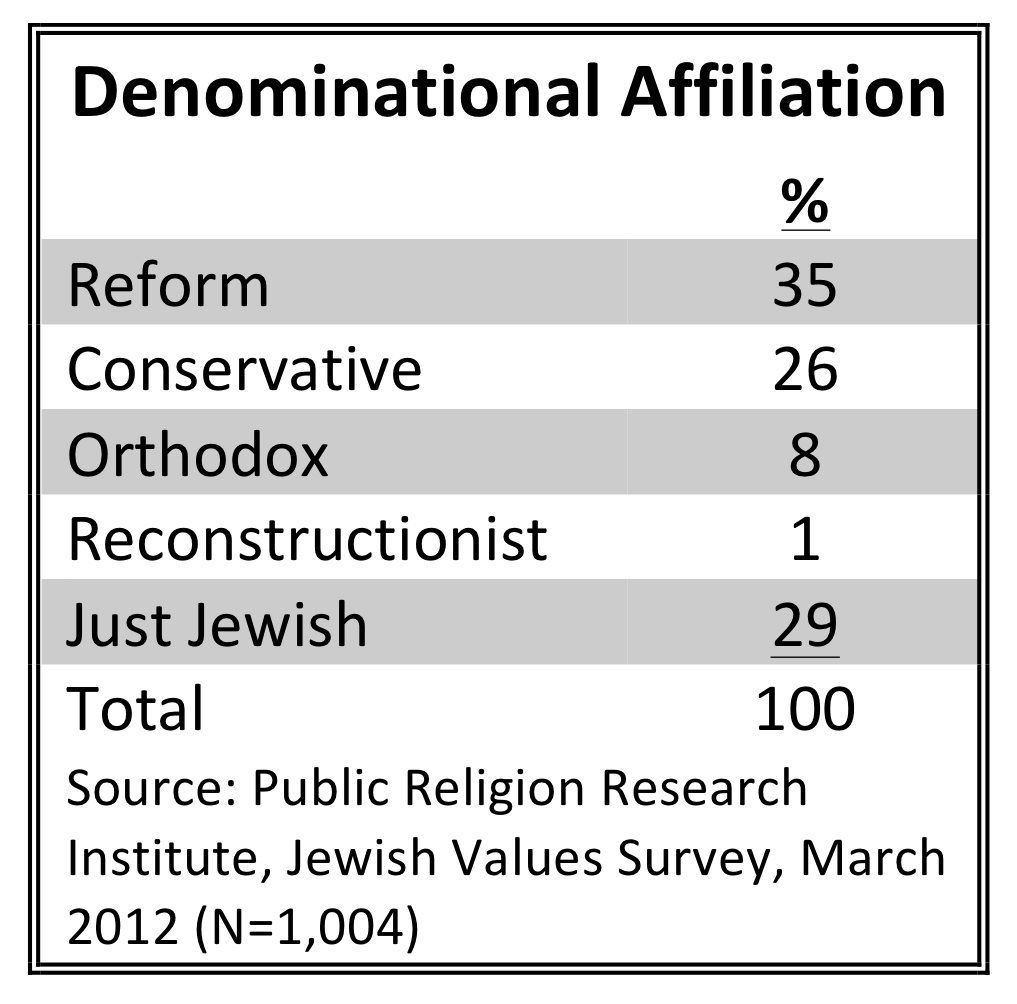 The current survey includes Jews who identify as Jewish by religion as well as Jews who do not identify as religious but identify as Jewish in other ways, such as culturally or ethnically. The following table gives the denominational affiliation breakdowns, along with the proportion of Jews who identify as “just Jewish.” See Appendix 1 for more detailed explanation of these categories.
The current survey includes Jews who identify as Jewish by religion as well as Jews who do not identify as religious but identify as Jewish in other ways, such as culturally or ethnically. The following table gives the denominational affiliation breakdowns, along with the proportion of Jews who identify as “just Jewish.” See Appendix 1 for more detailed explanation of these categories.
Approximately 6-in-10 American Jews identify with either the Reform movement (35%) or the Conservative movement (26%), compared to 8% who identify as Orthodox and 1% who identify as Reconstructionist. Jews who identify as “just Jewish” and do not identify with a specific denominational movement make up approximately 3-in-10 (29%) Jews.
Importance of Religion and Belief in God
Nearly 6-in-10 (59%) American Jews say that religion is at least somewhat important in their lives, compared to 41% who say religion is not too important or not at all important. Conservative Jews are more likely than Reform Jews to say religion is at least somewhat important in their lives (82% vs. 65% respectively). Only about 1-in-5 (19%) of those who identify as “just Jewish” say that religion is at least somewhat important in their lives.
There are no major partisan differences on the question of the importance of religion, but self-identified political conservatives (67%) and moderates (68%) are more likely than liberals (47%) to say that religion is at least somewhat important in their lives. Men are also less likely than women to say that religion is at least somewhat important in their lives (50% vs. 66% respectively). There are no significant differences by educational attainment on this question.
A plurality (40%) of Jews see God as an impersonal force, compared to 26% who believe God is a person with whom one can have a relationship, and 18% who say they do not believe in God. This pattern holds true for Jews who identify with both the Conservative and Reform movements. The pattern among all Jews also holds true for Jewish Democrats and Independents.
In contrast, a plurality (41%) of Jewish Republicans say God is a person with whom one can have a relationship, compared to 30% who say God is an impersonal force, and 16% who say they do not believe in God. Among those who identify as “just Jewish”, a plurality (44%) say they do not believe in God, compared to 27% who say God is an impersonal force and 15% who say God is a person with whom one can have a relationship. Younger Jews are about twice as likely as older Jews to say they do not believe in God (27% vs. 13% respectively). Jews without a college degree (40%) are twice as likely as Jews with college (19%) or post-graduate degrees (17%) to say that God is a person with whom one can have a relationship.
Synagogue Membership, Attendance, and Activities
Slightly more than one-third (35%) of American Jews report being a member of a local synagogue, compared to 60% who say they do not belong to a synagogue. Less than half of those who identify with the Conservative movement and Reform movement report being a member of a synagogue (49% vs. 39% respectively). In contrast, only 5% of those who identify as “just Jewish” say they belong to a synagogue. There are no major partisan differences in synagogue membership, but political conservatives are more likely than political liberals to claim synagogue membership (43% vs. 29% respectively). Younger Jews are half as likely as older Jews to report being a member of a synagogue (20% vs. 40%). Jews without a college degree are also less likely than Jews with post-graduate degrees to report being a member of a synagogue (27% vs. 44% respectively).
About one-fifth (21%) of American Jews report attending religious services at least once or twice a month, compared to 31% who attend a few times a year, and nearly half who say they seldom (21%) or never (26%) attend religious services. Jews who identify with the Conservative movement are less likely than those who identify with the Reform movement to say they seldom or never attend religious services (26% vs. 40% respectively). Among those who identify as “just Jewish,” 86% report seldom or never attending religious services. Younger Jews are significantly more likely than older Jews to say they never attend religious services (39% vs. 22% respectively). Those without a college degree also report lower levels of attendance than more educated Jews.
There is strong agreement among American Jews about the types of activities in which synagogues should be engaged. There is near unanimity (96%) in the belief that synagogues should be involved in acts of charity. Approximately three-quarters (76%) of American Jews agree that synagogues should be engaged in public policy advocacy to address social problems. In contrast, more than 7-in-10 (71%) say that synagogues should not be involved in supporting political campaigns or candidates.
On the issue of whether synagogues should engage in public policy advocacy to address social problems, Jews who do not claim a denominational affiliation or who are not members of synagogues are slightly less likely to say that synagogues should be involved. Approximately 8-in-10 members of the Reform (82%) and Conservative (79%) movements agree that synagogues should engage in public policy advocacy, compared to 66% of those who identify as “just Jewish.” Eighty-four percent of Jews who are members of synagogues agree that synagogues should engage in public policy advocacy, compared to 72% who are not members of synagogues. Jewish Democrats (81%) are more likely than Jewish Republicans (64%) to say that synagogues should engage in public policy advocacy. There are no large differences on this question by generation, gender, or educational attainment.
There is also widespread agreement among Jews who identify as Reform (72%), Conservative (79%), or “just Jewish” (69%) that synagogues should not support political campaigns or candidates. Jews who are members of synagogues, however, are less likely than Jews who are not to object to synagogues supporting political campaigns or candidates (64% vs. 78% respectively).
There are large partisan differences on this question. Sixty-eight percent of Jewish Democrats and 79% of Jewish Independents do not think synagogues should support political campaigns or candidates, compared to 59% of Jewish Republicans. More than 4-in-10 (41%) Jewish Republicans favor synagogues supporting political campaigns or candidates. Younger Jews are also more open to synagogues supporting political campaigns or candidates, although a strong majority are opposed. Sixty-three percent of younger Jews say synagogues should not engage in these activities, compared to 79% of older Jews.
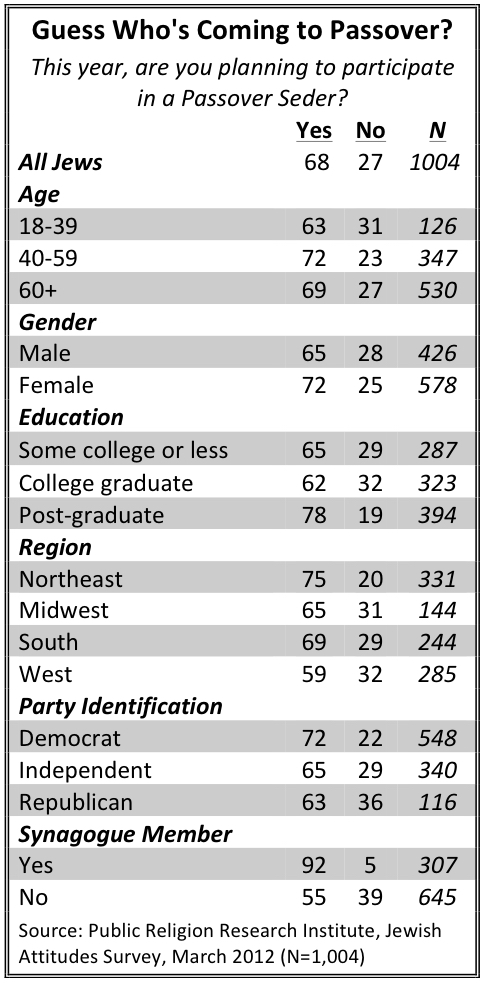 On the broader question of whether synagogues should work to expand economic opportunities and secure basic rights for all Americans, roughly three-quarters (74%) of American Jews report that this is very or somewhat important. There is widespread agreement across denominational lines and between Jews who are members of synagogues and those who are not: at least 7-in-10 of each of these groups say this work is somewhat or very important. There is one exception: support is slightly lower among Jews who identify as “just Jewish,” 62% of whom say it is somewhat or very important and nearly 4-in-10 (37%) of whom say it is not too important or not at all important. Nearly 8-in-10 (79%) of Jewish Democrats say it is somewhat or very important for synagogues to work to expand economic opportunities and secure basic rights for all, compared to 70% of Jewish Independents and 67% of Jewish Republicans. Younger Jews are also significantly less likely than older Jews to say that it is somewhat or very important for synagogues to work to expand economic opportunities and secure basic rights for all Americans (64% vs. 82% respectively).
On the broader question of whether synagogues should work to expand economic opportunities and secure basic rights for all Americans, roughly three-quarters (74%) of American Jews report that this is very or somewhat important. There is widespread agreement across denominational lines and between Jews who are members of synagogues and those who are not: at least 7-in-10 of each of these groups say this work is somewhat or very important. There is one exception: support is slightly lower among Jews who identify as “just Jewish,” 62% of whom say it is somewhat or very important and nearly 4-in-10 (37%) of whom say it is not too important or not at all important. Nearly 8-in-10 (79%) of Jewish Democrats say it is somewhat or very important for synagogues to work to expand economic opportunities and secure basic rights for all, compared to 70% of Jewish Independents and 67% of Jewish Republicans. Younger Jews are also significantly less likely than older Jews to say that it is somewhat or very important for synagogues to work to expand economic opportunities and secure basic rights for all Americans (64% vs. 82% respectively).
Jewish Holidays
When asked about the most important Jewish holiday to them personally, a plurality (43%) of Jews named Yom Kippur, followed by Passover (25%), Hanukkah (10%), and Rosh Hashanah (10%).
Jews who claim a denominational affiliation generally agree on the relative importance of these holidays. However, those who identify as “just Jewish” rank Passover as the most important holiday (26%), followed by Yom Kippur (23%), Hanukkah (20%), Rosh Hashanah (10%). Fourteen percent of those who identify as “just Jewish” say none of the holidays are important to them. There are no major partisan differences on the relative importance of holidays. Younger Jews generally share the views of older Jews about the relative importance of the holidays with one major exception: younger Jews are more than three times as likely as older Jews to say that Hanukkah is the most important Jewish holiday to them personally (20% vs. 6% respectively). They are also less likely to cite Yom Kippur (37% vs. 53% respectively).
More than two-thirds (68%) of Jews say they are planning to participate in a Passover Seder this year. With one exception, majorities of virtually every demographic group report that they are planning to attend a Seder this year. Despite the fact that many of those who identify as “just Jewish” rank Passover as the most important holiday to them, only 33% report that they are planning to participate in a Passover Seder this year. Among nearly every other group, including those who are not members of synagogues, however, majorities say they plan to attend.
Endnotes
1 Due to survey sample size limitations, we are unable to break out separate findings for Jews who identify with the Orthodox or Reconstructionist movements.
2 This section restricts analysis to Jewish voters. “Jewish voters” refers to Jews who report that they are registered to vote in their local precinct or election district. Ninety-one percent of American Jews report that they are registered to vote.
3 In June 2008, Gallup found that 62% of Jewish registered voters were supporting Obama, compared to 31% of Jewish registered voters who were supporting John McCain, the Republican candidate. According to the NEP exit polls in 2008, Obama ultimately won 78% of the Jewish vote, while McCain captured 21% (NEP Exit Poll, 2008). For Gallup’s tracking of the 2008 Jewish vote, see http://www.gallup.com/poll/111424/obama-winning-over-jewish-vote.aspx.
Recommended citation:
Jones, Robert P., and Daniel Cox. “Chosen for What?: Jewish Values in 2012.” PRRI. 2012. http://www.prri.org/research/jewish-values-in-2012/.
